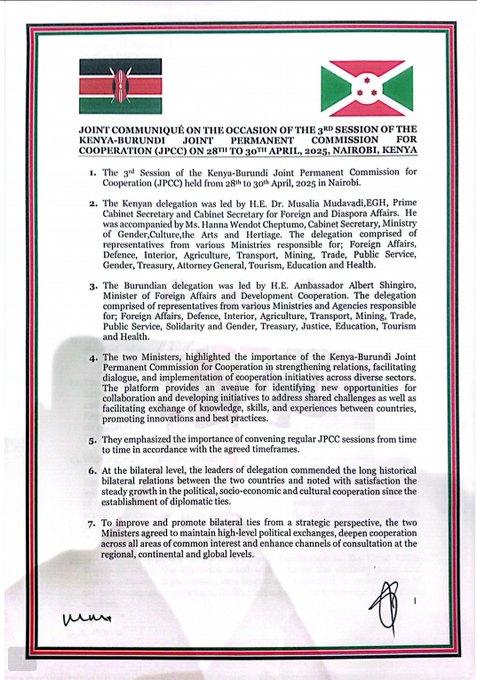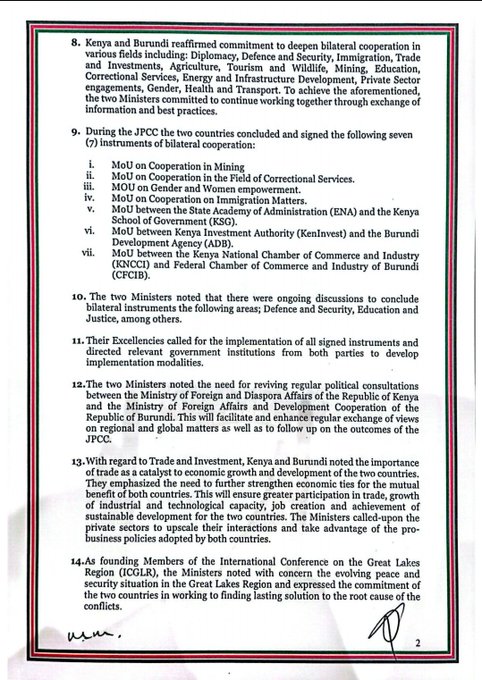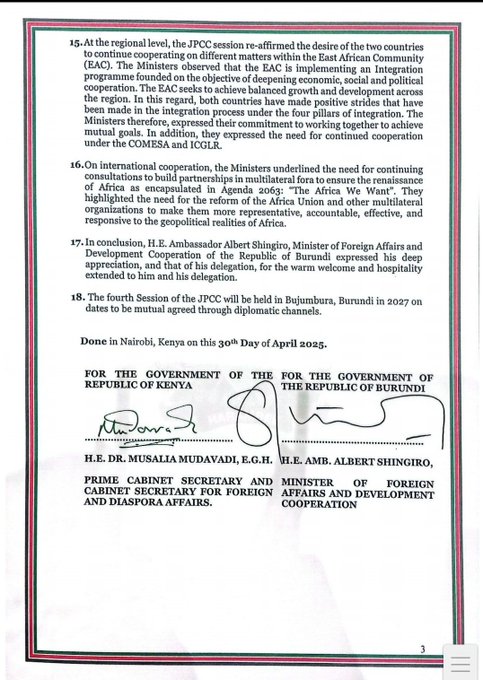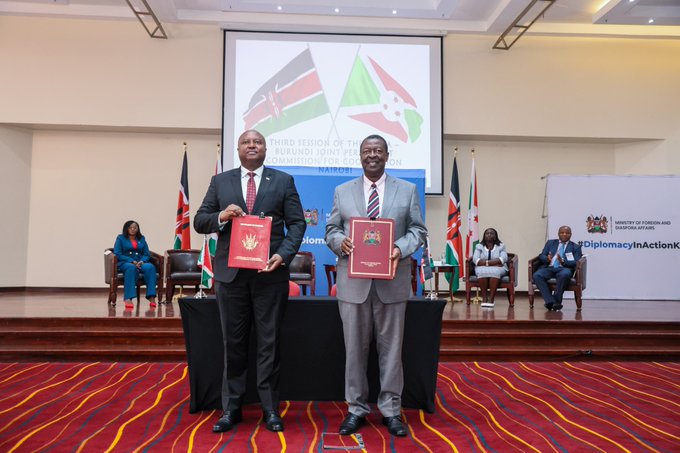NAIROBI, Kenya – Kenya and Burundi have strengthened their diplomatic and economic ties with the signing of seven critical Memoranda of Understanding (MoUs) during the 3rd Session of the Kenya-Burundi Joint Permanent Commission for Cooperation (JPCC), held from April 28 to 30, 2025, in Nairobi.
The agreements cover a wide range of sectors, including diplomacy, defence, trade, education, gender empowerment, and infrastructure, marking a significant step in enhancing bilateral relations between the two East African nations.
The Kenyan delegation, led by Prime Cabinet Secretary Dr. Musalia Mudavadi and supported by key cabinet members, including Cabinet Secretary for Gender, Culture, the Arts, and Heritage Hanna Wendot Cheptumo, represented various ministries across sectors like Foreign Affairs, Defence, Agriculture, and Education.
The Burundian delegation, headed by Minister of Foreign Affairs and Development Cooperation Ambassador Albert Shingiro, included officials from key ministries such as Defence, Interior, Agriculture, and Tourism.
The three-day meeting focused on identifying new opportunities for cooperation and finding solutions to shared challenges.
Both nations highlighted the importance of the JPCC as a platform to facilitate dialogue, share knowledge, and implement joint initiatives that would benefit their populations.
At the core of the discussions was the recognition of the strong historical relationship between Kenya and Burundi, with both parties emphasizing the steady growth in political, socio-economic, and cultural cooperation since the establishment of diplomatic ties.
The leaders acknowledged the need for regular high-level political exchanges to further deepen their cooperation, enhance diplomatic ties, and address regional, continental, and global matters of mutual interest.
Among the seven MoUs signed during the JPCC session were agreements on:
- Cooperation in Correctional Services: A commitment to enhance collaboration in improving prison systems, rehabilitation, and social reintegration programs for offenders.
- Mining: A partnership to foster the sustainable development of the mining sector, focusing on resource management and the exchange of best practices.
- Gender and Women Empowerment: An MoU aimed at promoting gender equality, women’s rights, and opportunities for empowerment across various sectors.
- Immigration Matters: A bilateral framework to streamline immigration processes and promote smoother movement of citizens between the two countries.
- Education and Governance: Agreements between the State Academy of Administration (ENA) and Kenya’s School of Government (KSG) to enhance administrative and governance capacity through joint training programs.
- Investment and Economic Development: A collaboration between Kenya Investment Authority (KenInvest) and the Burundi Development Agency (ADB) to increase trade, investment flows, and private sector engagements.
- Business Chambers Cooperation: An MoU between the Kenya National Chamber of Commerce and Industry (KNCCI) and the Federal Chamber of Commerce and Industry of Burundi (CFCIB) to boost bilateral trade and entrepreneurship opportunities.
Joint Communique: Third Session of The Kenya-Burundi Joint Permanent Commission for Cooperation (JPCC).
These agreements are aimed at deepening bilateral ties, improving access to essential services, enhancing economic growth, and providing opportunities for collaboration across sectors.
The ministers also highlighted ongoing discussions to conclude additional bilateral instruments in areas such as Defence and Security, Education, and Justice, underlining their commitment to further strengthening their relationship.
In the regional context, both Kenya and Burundi expressed their commitment to working together within the frameworks of the East African Community (EAC), COMESA, and the International Conference on the Great Lakes Region (ICGLR) to address peace and security challenges.
The two countries pledged to support peace-building efforts in the Great Lakes Region, aiming for lasting solutions to conflicts.
On the issue of trade and investment, the ministers emphasized the role of trade as a driver of economic growth and development.
They called for greater cooperation between the private sectors of both countries, urging businesses to take advantage of the pro-business policies in place to boost trade, industrial capacity, and job creation.
The session also underscored the importance of cooperation in multilateral forums such as the African Union and international organizations, with a focus on reforms to make these bodies more effective, accountable, and responsive to Africa’s geopolitical realities.
In closing, Ambassador Albert Shingiro thanked the Kenyan government for its warm hospitality and expressed his appreciation for the successful outcome of the discussions.
The ministers agreed to hold the next session of the JPCC in Bujumbura, Burundi, in 2027, marking another important milestone in the ever-strengthening partnership between Kenya and Burundi.







